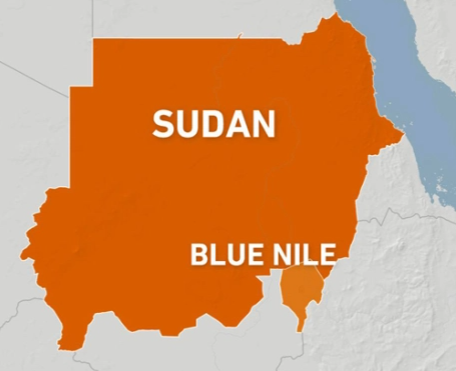At least 97,000 people have reportedly been displaced within Sudan’s Blue Nile state and into neighboring states following the inter-communal conflict that reignited in mid-July, the United Nations Office for the Coordination of Humanitarian Affairs (OCHA) said on Thursday.
Fighting between the Hausa tribe and the Hamaj and Berta tribes started in Wad Al Mahi locality—reportedly triggered by the death of two people from the Hamaj tribe—on 13 July 2022 and spread into several villages across Ar Rusayris locality between 14 – 16 July and then into Geisan locality on 24 October.
Hausa residents were subsequently expelled from the area and sought refuge with relatives in neighboring villages while some traveled to the Ed Damazine locality.
The latest International Organization for Migration Displacement Tracking Matrix (IOM DTM) and reports from DTM teams estimate that up to 359 people may have been killed and a further 469 injured since July.
According to OCHA, Security forces were deployed to areas of concern, and on 21 October, the Governor of Blue Nile declared a one-month State of Emergency.
“Over the past four days, the security situation has improved, and no incidents have been reported. Most shops and markets are currently open in Ed Damazine town,” the OCHA update said. “Most people affected have been displaced within the Blue Nile and into neighboring Sennar and White Nile states. However, the precise numbers and areas of displacement are still being verified and subject to variation. In White Nile State, authorities have established the Khor Ajwal gathering site to host the displaced Hausa arriving from Blue Nile State. In White Nile State, authorities have established a gathering site to host IDPs from Blue Nile State.”
OCHA said that preliminary findings from an inter-agency mission identified several humanitarian needs.
“The team visited 10 schools in Ar Rusayris locality and Ed Damazine town. About 34,000 people are taking shelter in overcrowded spaces without mosquito nets, sleeping mats, blankets, jerry cans, or any other basic items,” the statement said. “Due to this overcrowding, many IDPs have taken to sleeping out in the open. Women and girls are exposed to protection risks due to the limited space in the school compounds. The displaced people can access health services from five nearby facilities, but the capacity of the health services to meet the increasing needs is limited due to a shortage of supplies.”
According to OCHA, access to safe water is limited and there is only one functioning hand pump forcing some people to use untreated water from the River Nile.




